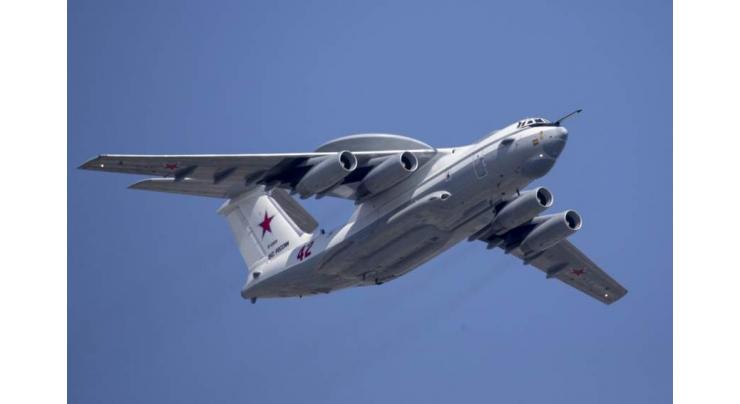
- Home
- World
- News
- Russia Has No Need to 'Steal' Hypersonic Technology From US Given Market Lead - Experts
Russia Has No Need To 'Steal' Hypersonic Technology From US Given Market Lead - Experts
Fahad Shabbir (@FahadShabbir) Published August 15, 2019 | 06:57 PM

Russia does not steal US military technology, as US National Security Advisor John Bolton has recently suggested, because the country already possesses hypersonic weapons that are yet not available to the United States, military experts told Sputnik on Thursday
MOSCOW (UrduPoint News / Sputnik - 15th August, 2019) Russia does not steal US military technology, as US National Security Advisor John Bolton has recently suggested, because the country already possesses hypersonic weapons that are yet not available to the United States, military experts told Sputnik on Thursday.
Earlier in the day, Bolton accused Russia of developing hypersonic glide vehicles and hypersonic cruise missiles based on stolen US military technology.
"Then why does the United States still not have these models while we [Russia] do? It shows that we really are ahead of the United States both in the hypersonic technology and advanced delivery vehicles, for which we use our own capacities. Bolton's statement is simply another example of the anti-Russia rhetoric of top-ranking US officials," Russian military expert Igor Korotchenko said.
Building hypersonic weaponry only by technologies that already exist is impossible, as it requires the simultaneous development of several areas of the economy and science, such as materials science and precise mechanics, according to Korotchenko.
Bolton's allegation that Russia relies largely on "stolen American technology" to develop hypersonic weapons could be his way of explaining to US taxpayers why their country does not possess such weapons, the expert suggested.
According to Viktor Murakhovsky, another military expert and a member of the Russian Military-Industrial Commission, the physics of atmospheric and hypersonic motion are the same in all parts of the world, meaning that Russian and US hypersonic weapons are unlikely to drastically differ from one another.
With that, Russia has already begun serial production for its Avangard hypersonic glide vehicles, started trial operations of the Kinzhal air-launched hypersonic ballistic missile and announced that it would soon begin producing Zircon hypersonic cruise missiles, he added.
"In practice, we [Russia] are are ahead of them [the United States]. I believe, based on the current stage of mere sketches and prototypes that they are at, it will take them at least 5-7 years to get an actual product," Murakhovsky said.
The main elements of technologies required for hypersonic transport, such as thermal insulation and thermal protection materials, started being developed in the Soviet Union, when thermal shields were created for multiple use on the Buran spacecraft, which entered the atmosphere at hypersonic speeds in 1988, Murakhovsky explained.
Today, Russia's intercontinental ballistic missiles are equipped with warheads which can perform atmospheric entries at hypersonic speeds, he added.
The United States has repeatedly accused Russia of developing advanced ballistic and hypersonic delivery systems and modernizing its inventory allegedly in violation of the bilateral 1987 Intermediate Nuclear Forces (INF) Treaty. Russia has denied all allegations. The military pact, which was officially abandoned on August 2 at Washington's initiative, required the two countries to eliminate and permanently forswear all nuclear and conventional ground-launched ballistic and cruise missiles with ranges of 500 to 5,500 km (310 to 3,417 miles).
Related Topics
Recent Stories

Currency Rate In Pakistan - Dollar, Euro, Pound, Riyal Rates On 25 April 2024

Today Gold Rate in Pakistan 25 April 2024

Mired in crisis, Boeing reports another loss

Session Awarding Ceremony 2024 held at Cadet College Muzaffarabad

Austrian ski great Hirscher to make comeback under Dutch flag

Pakistan, Japan agrees to convene 'Economic Policy Dialogue'

FM Dar conveys deepest sympathy on torrential rains devastation in UAE

Spain PM Sanchez says weighing resignation after wife's graft probe

Tennis: ATP/WTA Madrid Open results - 1st update

Long-lost Klimt portrait auctioned off for 30 mn euros

Osaka seals first win on clay since 2022 in Madrid

Earthquake jolts Karachi
More Stories From World
-
N. Macedonia's right-wing presidential candidate wins 1st round
9 minutes ago -
Vietnam court jails soft drinks tycoon in $40 million scam case
9 minutes ago -
The guardian angels of the source of the Seine
29 minutes ago -
Star Dudamel brings inclusive vision to New York Philharmonic
1 hour ago -
Paris dream of swimming in the Seine finally within reach
2 hours ago -
Portugal's Carnation Revolution, 50 years on
2 hours ago
-
Tough times for Argentine factories as consumers penny-pinch
2 hours ago -
Use of alcohol and e-cigarettes among youth 'alarming': WHO
2 hours ago -
Football: Italian Cup result
2 hours ago -
Bird flu in humans? Experts see little risk
2 hours ago -
Car giants vie for EV crown at Beijing's Auto China show
2 hours ago -
Meta profits soar but costs of AI cause worry
2 hours ago